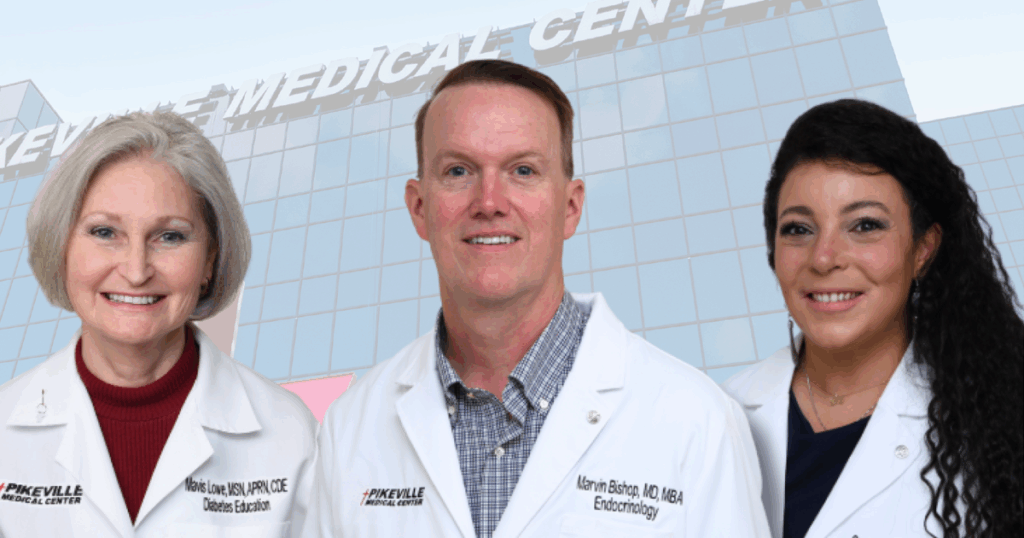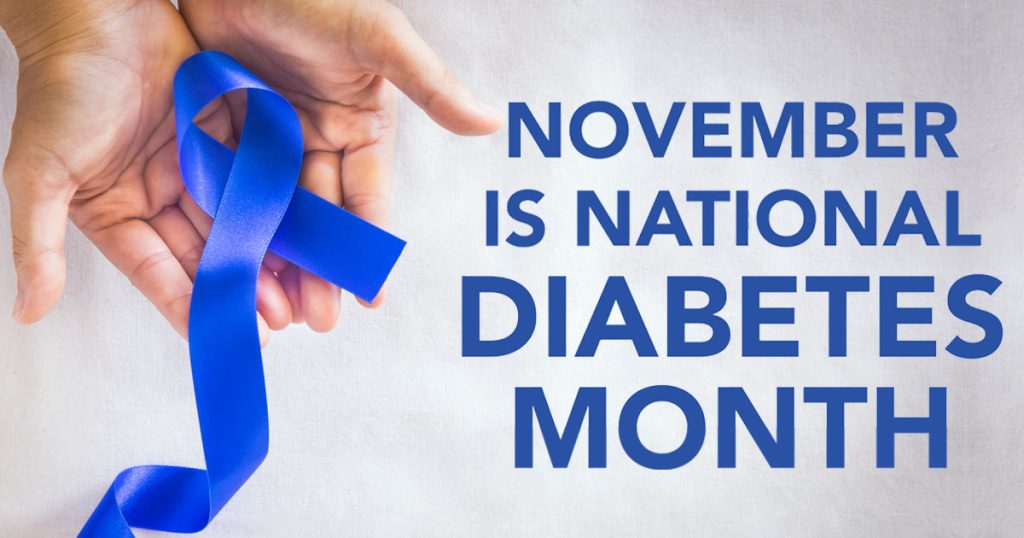
The rate of adults diagnosed with diabetes is significantly greater in the Appalachian region than in any other area and is the most common disease in Kentucky. Diabetes, specifically type 2 diabetes, has greatly affected the health of patients in the region. From the increased probability of serious health problems to increased medical bills, diabetes has negatively impacted thousands of lives.
The positive news is that by making small healthy lifestyle changes, it is possible to prevent diabetes and even reverse prediabetes.
Pikeville Medical Center Can Help Manage and Treat Diabetes
- Endocrinology Care – Mavis Lowe, MSN, APRN, BC-ADM, CDCES, is an endocrinology Nurse Practitioner who specializes in the treatment of diabetes and Diabetes Education. Learn more about Endocrinology at Pikeville Medical Center.
- Diabetes Education – Sandra Chaney leads PMC’s Diabetes Education Department. Learn more about Pikeville Medical Center’s Diabetes Education Programs.
- Family Medicine Care – PMC primary care clinics have knowledgeable providers who help diabetic and prediabetic patients track diabetes symptoms and develop plans for a healthy lifestyle. Find a PMC Primary Care Provider near you.
- Podiatry Care – Mariano Rivera, DPM, FACFAS, is a podiatrist who offers treatment for nerve for patients experiencing nerve damage and skin conditions in their feet.
- Wound Care – Pikeville Medical Center’s Wound Center offers specialized care to diabetic patients needing care for slow-healing diabetic wounds and ulcers.
- OB/GYN Care – Pikeville Medical Center’s obstetrics team monitors women throughout pregnancy for gestational diabetes.
Diabetes is a group of diseases in which a person has high blood sugar because the body either does not produce enough insulin or does not use insulin in the way that it should.
Prediabetes is a health condition in which patients have higher than normal blood sugar, but not yet high enough level to be diagnosed with type 2 diabetes. Most people living with prediabetes don’t know they have it. The following factors put you at higher risk for prediabetes and the onset of type 2 diabetes:
- Being overweight
- Being 45 years or older
- Smoking
- Having a parent or sibling with type 2 diabetes
- Poor diet
- Exercising less than three times per week
- Having a history of gestational diabetes or giving birth to a baby who weighed more than 9 pounds
- Having polycystic ovary syndrome (PCOS)
Type 1 diabetes is an early-onset autoimmune disorder where your body does not produce insulin. It often presents in childhood and is something patients will manage throughout their lifetimes.
Type 2 diabetes, on the other hand, is a treatable condition caused by poor health habits and obesity. Type 2 diabetes occurs most often in adults when the body does not produce enough insulin or doesn’t process insulin the way it should.
Gestational diabetes is a type of diabetes that can develop during pregnancy. During pregnancy, a woman’s body makes more hormones and goes through other changes, such as weight gain. These changes cause the body’s cells to use insulin less effectively, a condition called insulin resistance.
While type 1, type 2 diabetes and gestational diabetes stem from different origins, they often share similar symptoms and consequences. Whichever the condition you or a family member may be experiencing, PMC has a well-rounded team of specialists that can help.
The symptoms of diabetes can be difficult to recognize so it is important to know the risk factors and attend regular doctor visits.
If you experience two or more of the following symptoms, you should consult your family medicine physician for screening:
- Urinate often, especially at night
- Extreme thirst
- Lose weight without trying
- Extreme hunger
- New or unusual blurred visions
- Numbness or tingling in the hands or feet
- Fatigue, or feeling very tired
- Dry skin
- Slow-healing wounds and sores
- More infections than usual
Some patients living with diabetes may exhibit no symptoms until their condition is severe. If you are at higher risk for prediabetes or type 2 diabetes, you should talk to your primary care provider about routine blood sugar testing – a simple screening that can be conducted in-office.
When unmanaged, diabetes may lead to serious health problems, including:
- Hypertension
- High cholesterol
- Coronary heart disease
- Kidney failure
- Stroke
- Retinopathy and vision loss
- Neuropathy, or nerve damage
- Amputation of fingers, hands, toes, feet and legs
- Gum disease and loss of teeth
- Depression
There are lifestyle changes that you can make to manage/reverse prediabetes and prevent Type 2 diabetes.
- Take small steps. Making changes to your lifestyle and daily habits can be hard, but you don’t have to change everything at once. It is okay to start small. Remember that setbacks are normal and do not mean you have failed—the key is to get back on track as soon as you can.
- Move more.Limit time spent sitting and try to get at least 30 minutes of physical activity, 5 days a week. Start slowly by breaking it up throughout the day.
- Choose healthier foods and drinks most of the time. Pick foods that are high in fiber and low in fat and sugar. Build a plate that includes a balance of vegetables, protein, and carbohydrates. Drink water instead of sweetened drinks.
- Lose weight, track it, and keep it off.You may be able to prevent or delay diabetes by losing 5 to 7 percent of your starting weight.
- Seek support. It is possible to reverse prediabetes. Making a plan, tracking your progress, and getting support from your medical provider can help you make the necessary lifestyle changes. Pikeville Medical Center is here to help.
- Stay up to date on vaccinations. The COVID-19 and flu vaccines are especially important for people who may be more likely to get very sick from COVID-19 or the flu, such as people with diabetes.
Source: National Institute of Diabetes and Digestive and Kidney Diseases
Diabetes Education
PMC May Tower 2nd Floor
911 Bypass Road, Bldg. A
Pikeville, KY 41501
606-430-8120
Recent Diabetes-Related News

High Rates of Diabetes: PMC Endocrinology Team Here to Help
The rate of adults diagnosed with diabetes is significantly higher in the Appalachian region than in any other part of the country. While diabetes can

Promoting Diabetes Awareness Ahead of the Holiday Season
While many people think of November as the beginning of a holiday season full of feasts and sugary treats, health advocates across the country recognize

Promoting Diabetes Awareness Ahead of the Holiday Season
While many people think of November as the beginning of a holiday season full of feasts and sugary treats, health advocates across the country recognize

Diabetes – Do You Know the Risk Factors?
Nearly everyone is familiar with the term Diabetes, but not everyone is familiar with the disease itself. Statistics show that more than 37 million people

Specialized Wound Care Helping Patients
In children, skinned knees and elbows are common and usually heal with little more than a bandage. However, with age, wounds take longer to heal.

Weight Loss Surgery Helps Patients Overcome Diabetes
Make 2020 the year to lose weight and improve your overall health. Pikeville Medical Center (PMC) Weight Loss and General Surgeon Amy Johnson, MD, has

